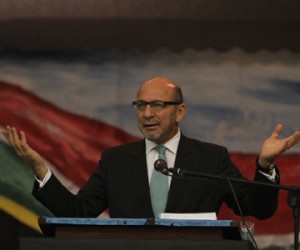Minister in the Presidency responsible for the National Planning Commission, Trevor Manuel has continuously expressed serious concern about the low return on investment that South Africa gets out of spending almost R300-billion annually on education.
“As a former minister of finance I know we don’t get value for money out of our education system,” he said at the Rachel’s Angels annual lecture.
Rachel’s Angels is a mentorship programme that operates in the Western Cape in association with the University of Stellenbosch. The programme aims to improve grade 11 and 12 learners’ academic abilities and to enrich their life skills by involving senior students from the university as mentors.
Manuel and his office played a pivotal role in starting a ‘local education forum’ which could come up with an amicable solution to the problem which involved plans to build an additional school in Grabouw.
Referring to the sometimes shocking results of the Annual National Assessments (ANA) in public schools, the minister said he was very scared about the situation.
“There were instances where some learners had not answered a single item in some tests.” Adding insult to injury, the World Economic Forum ranked South Africa last in a survey about the quality of maths and science education done in 62 countries.
The planning commission wants to turn the situation around with its 2030 Plan. After identifying the poor quality of education for black learners as the second most pressing challenge (unemployment being the first) in its diagnostic report, the commission’s 2030 plan proposed to improve the country’s education system.
This will require good pre-school learning, investments in mathematics and science teaching, promoting learner retention rates and producing positive outcomes in all schools, as President Jacob Zuma reminded a combined sitting of the National Assembly and the National Council of Provinces in August when the 2030 Plan was officially handed over to the government.
But it is precisely this scary reality described by Manuel – poor results in maths and science, low enrolment at universities – that illustrates the need for such interventions as the Rachel’s Angels mentorship programme.
Started in 2007, the programme gets students from Stellenbosch University (Maties) to act as mentors for learners from previously disadvantaged schools and aims, particularly, to contribute to academic excellence and to encourage more students from disadvantaged communities to opt for tertiary education.
It is encouraging that eight South African universities find themselves in the top 10 of the 2012 World University web ranking of the ‘Top 100 Universities and Colleges in Africa’. They are: the University of Cape Town, UCT (1), Maties (2), the University of Pretoria (Tuks) (3), the University of the Witwatersrand (Wits) (4), the University of KwaZulu-Natal (UKZN) (5), Unisa (6), Rhodes University (9) and the University of the Western Cape (10).
However, in world rankings the picture looks significantly different with only one South African university featuring in the latest Quacquarelli Symonds (QS) World University Rankings’ Top 200 and one in the Top 400.
These two are UCT (remaining Africa’s top-ranked institution, rising from position 156 overall in 2011/12 to 154 in 2012/13) and Wits (who improved from position 399 to 363).
President Zuma was particularly pleased by the planning commission’s prediction “that if we get basic education right, we can be able to increase enrolment at universities by at least 70% by 2030”, when he received the commission’s plan.
That amount of university student enrolments is ambitious. The stumbling block for such a high number of enrolments in universities is the negative impact of bad schooling and pass rates.
But the 2030 plan does not belong to the planning commission, Manuel said in his Rachel’s Angels lecture: it is also a call to action for ‘active citizenship’; in other words, through communities taking responsibility to make things happen. “After all, the struggle for democracy was not about doing nothing (to improve the country).”
The alternative would be to accept that our youth may today be ‘free’ from apartheid, but that they may in future become the laughing stock of the world for being ‘dom’, or dumb.






